What Type Of Water Filter Do I Need
What are Water Filters?
Water Filters remove unwanted impurities from water such as sediment, taste and odour, hardness and bacteria to result in improve quality water. From producing better-tasting drinking h2o to more specialist applications such as brewing coffee and making crystal clear water ice, we offer a huge range of filters and cartridges to solve whatever number of water-related issues.
The 5 Types of Filters
Bailiwick to your application, i.due east. what you're trying to remove or in some circumstances trying to stop, there are 5 types of water filters: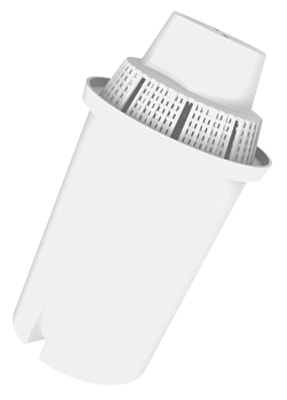
- Mechanical Filters
- Absorption Filters
- Sequestration Filters
- Ion Substitution Filters
- Reverse Osmosis Filters
Each ane of these addresses a different h2o problem and many filters really use a combination of these methods to perform multiple levels of filtration.
How Do They Work?
H2o is one of the about important substances on the planet, it covers 71% of the World's surface and the human torso can contain equally much equally 75% of the stuff. H2o is vital to a huge number of applications including agriculture, scientific discipline, medical, transportation, heating, recreation and food processing also equally washing and perhaps most important of all: drinking.
For the majority of u.s.a., drinking h2o comes from a treated municipal supply which is safe to beverage just will ofttimes feature unpleasant tastes and odours from chemicals such equally chlorine which are used to disinfect the water and keep information technology costless of germs and bacteria. Depending on where you lot alive, you may also observe that your mains water causes limescale deposits to form which can block pipes and damage appliances. These issues, chlorine gustatory modality / odour and limescale formation are merely two amid a host of other common water problems which can exist solved by water filtration. Merely how do h2o filters actually work?
Mechanical
The basic idea of mechanical filtration is to physically remove sediment, dirt or whatsoever particles in the water using a bulwark. Mechanical filters can be anything from a bones mesh that filters out large debris to a ceramic filter which has an extremely circuitous pore structure for ultra-fine filtration of pathogenic organisms.
A filter that utilises mechanical filtration volition usually be given a micron rating which indicates how effective the filters are in terms of the size of the particles information technology is capable of removing. Mutual ratings y'all might encounter include:
- 5 micron - Will remove most particles visible to the naked eye.
- 1 micron – Volition remove particles which are too minor to see without a microscope.
- 0.five micron - Will remove cysts (giardia and cryptosporidium).

Wound sediment filter with a 100 micron rating for mechanical filtration
Absorbtion
Assimilation in h2o filters is most unremarkably carried out past carbon, which is highly effective at capturing water-borne contaminants. The reason carbon absorbs contaminants and so readily is that information technology has a huge internal surface which is jam packed with nooks and crannies that can trap chemical impurities such as chlorine.
Most mutual domestic filters contain granular activated carbon (GAC) which reduces unwanted tastes and odours past absorption. More than expensive filters employ carbon cake elements which are generally more effective and usually carry a micron rating for particle removal.
A variety of dissimilar substances tin be used to make carbon for filters including wood and coconut shell, with coconut shell filters existence more effective just also more expensive.
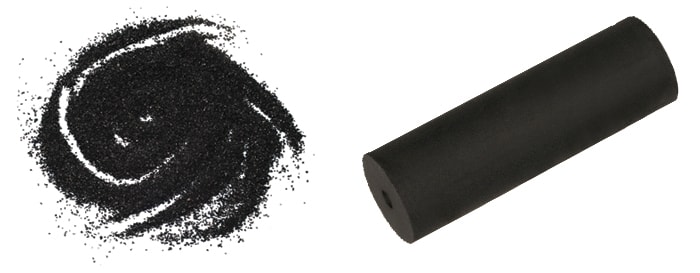
Granular activated carbon and a carbon cake for absorption filtration
Sequestration
Sequestration is the action of chemically isolating a substance. Food grade polyphosphate is ordinarily used in scale inhibiting filters to sequester the calcium and magnesium minerals which cause limescale and corrosion. Even so, polyphosphate is generally but introduced in very modest amounts and it merely inhibits scale rather than eradicating information technology. This ways that polyphosphate does not soften the water but instead works to keep the minerals within the solution, preventing them forming as scale on any surfaces they come into contact with.
Due to the hard minerals even so being present in the water, calibration inhibition isn't suitable for all applications. Instead, h2o softening using a process such as ion commutation is normally recommended in water areas with alkalinity levels of 180ppm or more (very hard water) and applications where water is kept at a constant temperature of 95°C or more than.
Ion Commutation
Ion exchange is a process used to soften hard water by exchanging the magnesium and calcium ions establish in difficult water with other ions such every bit sodium or hydrogen ions. Unlike calibration inhibition, ion commutation physically removes the hard minerals, reducing limescale and making water suitable for applications where it is kept at a constant high temperature e.g. in commercial coffee machines.
Ion substitution is most commonly carried out using an ion exchange resin which ordinarily comes in the form of small-scale beads. A similar type of resin is used in some Water Softeners and in the case of a water softener the resin utilises sodium ions which demand to exist periodically recharged to prevent the resin becoming ineffective. As water filters are unremarkably sealed units you would simply replace the filter with a new ane though it should exist noted that
Calcium Handling Units (CTUs) tin can be returned to the supplier and regenerated.
Resins that utilize sodium ions aren't unremarkably used in drinking water filters as the amount of salt (sodium) that can be present in drinking water is legally limited to 200 milligrams/litre. Every bit sodium ion exchange increases table salt levels, a hydrogen based ion exchange resin is the preferred option for filters.
Reverse Osmosis
Opposite osmosis (RO) is the procedure of removing dissolved inorganic solids (such as magnesium and calcium ions) from water past forcing it through a semipermeable membrane under pressure and so that the water passes through but most of the contaminants are left behind.
Reverse osmosis is a highly effective fashion of purifying water and is usually combined with a number of other filters such as a mechanical (sediment) filter and an absorption (activated carbon) filter in club to return water with few contaminants remaining.
Contrary osmosis systems use water pressure to strength water through the membrane so it uses no electricity, though a certain amount of waste product h2o is produced that has to be sent to the drain. The extra filters involved in multi-stage water filtration can make a reverse osmosis unit more expensive than other filtration methods but in applications where 99.9% pure water is required, RO offers the finest level of filtration bachelor as is increasingly existence used to treat water made for Java
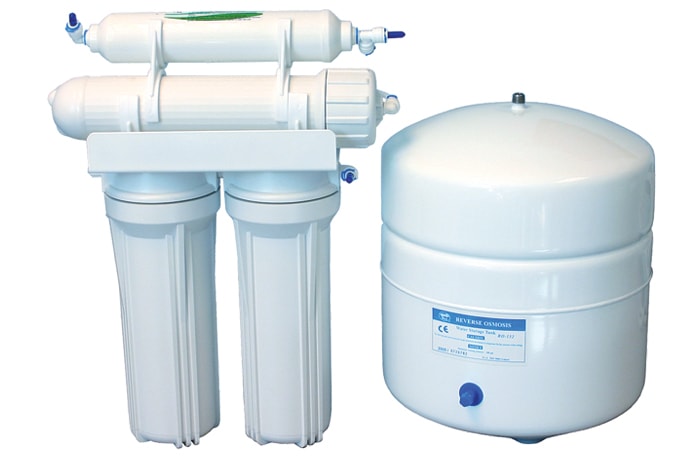
four stage domestic drinking h2o reverse osmosis arrangement
Combinations
Each filtration method has limitations on what it tin can remove, so near water filters or filtration systems use a combination of methods to achieve a specific level of water purity. To give an example, household water jug filters volition generally use mechanical, assimilation and ion-exchange whereas inline filters will utilise mechanical and assimilation with the possible inclusion of sequestration if the filter is designed to inhibit scale. Reverse osmosis systems tin utilise mechanical, absorption and of class reverse osmosis depending on how many stages the RO arrangement has.
By agreement of the v different methods by which water can be filtered and the way they tin can be combined, yous should hopefully notice it easier establishing which kind of filters yous need for any given awarding.
Water Filter Systems
Water Filter systems remove unwanted tastes and odours from mains h2o to provide make clean, fresh-tasting water directly from your tap. The domestic systems such every bit a Watergem are compact and easy to install under a sink or small space. Commercial water filter systems are slightly dissimilar depending on the apply in the kitchen or on the speciality equipment. H2o filter systems come up fully equipped with the kit to get you set up and tapped in to the existing water line.
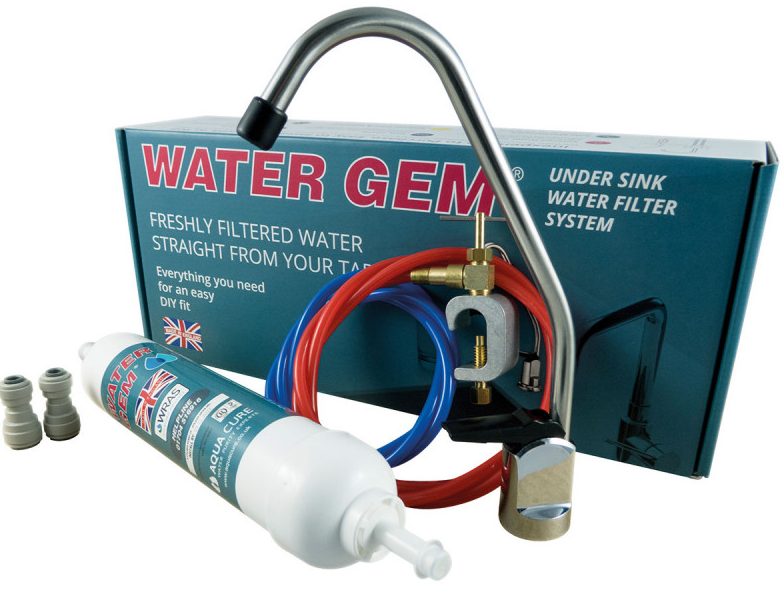
Watergem under sink water filter organisation
Coffee Machine Water Filters
Water is imperative in making the perfect coffee. Normal filtration rules don't utilize to the coffee edible bean which needs a very special blend of minerals before it will release its full flavour. This, complete with protecting and cleaning expensive espresso machinery ways coffee machine filters are some other level, luckily nosotros are well equipped to handle coffee machine water filters
Inline H2o Filters
Inline filters sit down straight on the water line or apparatus and the water passes through the filter before reaching the tap or apparatus. Commonly used in households this type of filtration is perfect for nether-sink installations due to its small size.
Inline filters can reduce common problems with municipal water such equally chlorine sense of taste, odour and bacteria's providing bottled h2o tasting water without the plastic waste product. The Hydro + range of inline water filters are ane of Europe's top selling filters.

One of Europes top selling filters
Drop In Filters
Drop-in filters are made to fit inside of a water filter housing. Housings vary depending on the use but the most common sizes are 10" and 20". We also stock Jumbo housings and the Watts Large Bubba housing
Fridge Filters
Fridge filters are required to filter the feed water coming through to the drinking water and ice mechanism. Almost commonly found on American style fridge freezers, the size and compatibility of the filter varies depending on make/model and style of the fridge freezer.
Water Filters for Commercial Foodservice
Combi ovens rely on skilful quality h2o for their steam. The chemic reaction of poor-quality water beingness heated to produce steam or hot h2o, is a master contributing cistron of causing limescale which tin can lead to breakdowns. Everpure Claris are 1 of the most trusted brands and supply catering equipment manufacturers and their service partners tailored combi oven filters
You Might Like
To View Our Range Of Filters
We stock a wide variety of the above h2o filters and replacement filters that remove unwanted impurities from water such as sediment, taste and odour, hardness and bacteria to result in better quality h2o.
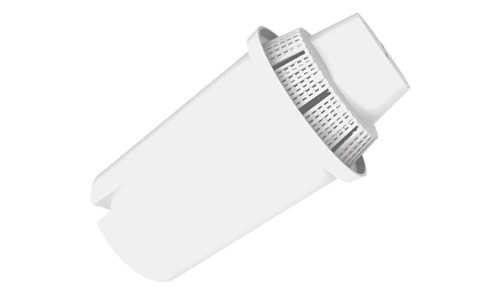
What Type Of Water Filter Do I Need,
Source: https://www.aquacure.co.uk/knowledge-base/how-water-filters-work
Posted by: robersonbles1976.blogspot.com


0 Response to "What Type Of Water Filter Do I Need"
Post a Comment